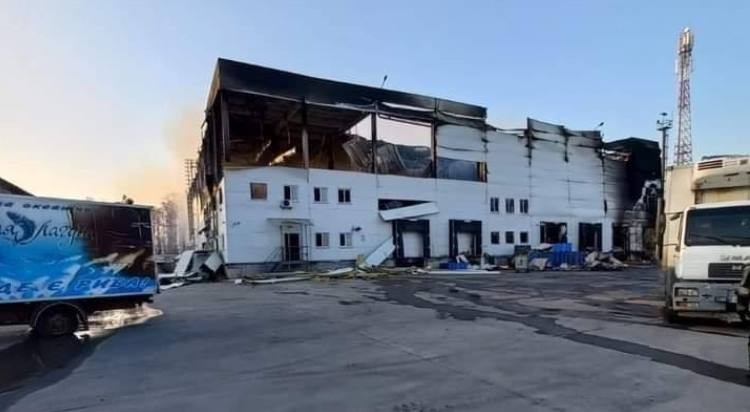
The logistic real estate market of Ukraine has been seriously damaged during the military aggression on the part of the Russian Federation. Warehouses are subjected to targeted attacks, as they are regarded by the aggressor as strategic objects, providing logistics, delivery of food and essential goods. On the territory of the Kyiv region, warehouse and logistics complexes with a total area of about 382,000 square meters were destroyed, writes Iryna Nastych summarised the situation in an article prepared by the Ukrainian Real Estate Club for Property Forum.
While hostilities are ongoing, it is impossible to make a complete analysis of the damage caused, analysts calculate losses based on the information that can be obtained. Thus, according to CBRE Ukraine, as of June 2022, the military operations in the Kyiv region resulted in the destruction of warehouses and logistics complexes with a total area of approximately 382,000 sqm (including office premises and other buildings on the territory of the complexes). Almost 340,000 sqm of net warehouse space was either wholly or partially destroyed, comprising 22% of the total stock of warehousing space in the Greater Kyiv area (1.6 million sqm as of the end of 2021).
Among the storage facilities that were completely destroyed due to missile attacks and fires: Mirazh 1 (GBA 29,800 sqm), the main tenant of which was an electronics retailer, Komodor Logistics Park (GBA 68,900 sqm), a warehouse complex for Kuehne + Nagel (GBA 19,000 sqm), a distribution centre on the left bank of Kyiv (GBA 24,000 sqm), owned by the largest Ukrainian food retailer ATB; Prologistic Services complex (GBA 10,250 sqm), which housed the Lipton tea factory, Unilever, warehouse facility UTA Service (GBA 23,000 sqm), vegetable warehouse Vegi Trade (GBA 20,000 sqm), warehouse complex Vorzel Terminal (GBA 12,100 sqm) and Andakta (GBA 6,300), whose tenant was a pharmaceutical distributor. At the same time, a distribution centre in Kopylov village (GBA 30,460 sqm), owned by ATB network, one of the largest cold storage facilities in the region RLC (GBA 63,000 sqm), warehouse complexes West Gate Logistic (GBA 97,000 sqm) and Terminal II in Bucha (GBA 32,000 sqm), owned by Dragon Capital investment company, and pharmaceutical warehouse Trans West (GBA 9,500 sqm), located in Milaya village were partially destroyed. Among the main tenants of the warehouse West Gate Logistic were Bohnenkamp Ukraine, Good Wine, Ekol Logistics Ukraine, Logistic Plus, Watsons, SAVService, DC Ukraine and Mary Kay. The total area of the above-mentioned warehouses subjected to partial destruction is 164,000 sqm.
The storage facilities located along the M-06 highway suffered most of all. Warehouses and logistics complexes that were located along the Warsaw highway (M-07) near the towns of Bucha, Gostomel and the Vorzel settlement in the Buchan district also suffered significant damage. Zhytomyr direction (M-06) was the most popular for warehouse construction and by the end of 2021, the total area of warehouses in this direction was over 290,000 sqm, while for Warsaw direction (M-07) the total area of warehouses located along this route was approximately 90,000 sqm. Comparatively less destruction of warehouse facilities occurred in the Chernigov direction (M-01).
The analysis of the destruction of storage and logistics facilities in the Kyiv region indicates that this was deliberate destruction by the Russian army to cut off Ukraine's most important logistics chains.
In recent years, the demand for warehousing space remained at a fairly high level, according to experts of CBRE Ukraine. Thus, the destruction of 22% of warehouse space only in the Kyiv region is evidence of the forced relocation of logistics and warehousing hubs to other areas of Ukraine, where there is a competitive quality supply, infrastructure for accommodation, and prices that match the quality of real estate, as well as local authorities that encourage and promote tenants to relocate. Since the Kyiv region has lost sufficient supply due to military action to provide accommodation for all players who plan to return to the de-occupied region, Vynnitsa, Khmelnytskyi, Ternopil and other regions are becoming popular locations as a counterweight to the western region.
According to the forecasts of Dmitry Pasenkov, the Head of the Department of warehouse real estate at Cushman & Wakefield, under normal market conditions for the recovery of the sector in the regions that have suffered significant losses as a result of the Russian aggression will take 1.5-2 years.
Requests are already coming in to assess the destruction of individual objects, defect them and determine the possibility of restoration. "These inquiries are related to the fact that the current owners plan to restore the damaged property, which is quite understandable because even with complete destruction of a building there are segments which can be used for restoration,” explains Yuri Skolozdra, Head of the DELTA Ukraine office in Lviv. “We can assume that even quite damaged warehouses have a 10-20% residual value".



